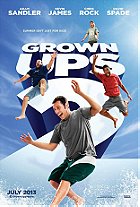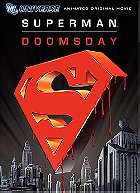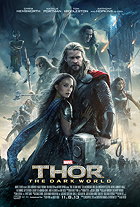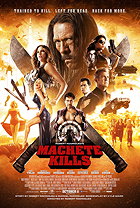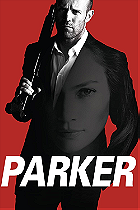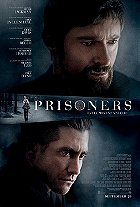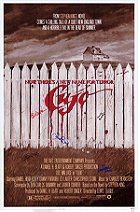The concept behind Casa de mi Padre can be summed up very simply: Will Ferrell in a telenovela spoof - in Spanish! It's the type of pitch that one would expect for a short Saturday Night Live skit, which is unsurprising since Casa de mi Padre's writer and director have been involved in SNL for years. A Spanish-language parody of low-budget Mexican serials, this is an oddball comedy, but it's not nearly as insane or downright hilarious as it had the potential to be. Its restrained approach is commendable since it compels Ferrell to attempt a different brand of humour, but the finished movie is only marginally successful, with only a handful of laughs here and there. The premise would be better suited for a ten-minute sketch, as it feels too scattershot as an 85-minute feature.

Seen as a moron by those around him, Armando Alvarez (Ferrell) is the black sheep of his family, often being unfavourably compared to his successful drug-dealing brother Raul (Diego Luna). When Raul returns to the family ranch, he brings his new fiancée Sonia (Genesis Rodriguez), with whom Armando is immediately smitten. Further trouble soon arises in the form of The Onza (Gael García Bernal), a dangerous drug lord who enters a turf war with Raul. With death and destruction unfolding all around him, Armando is given the chance to prove he's not a screw-up and hopefully win the heart of Sonia as well.
The main joke of Casa de mi Padre, of course, is the fact that the white, completely non-Mexican Ferrell is playing a Mexican role, delivering his dialogue entirely in Spanish. But the humour does go deeper than that, with writer Andrew Steele serving up a steady stream of amusing moments that parody low-budget Mexican filmmaking. Casa de mi Padre is to Spanish melodrama what Black Dynamite is to '70s blaxploitation, with the characters delivering cornball dialogue in a hilariously sincere manner, and with the technical limitations of Mexican cinema being affectionately recreated by director Matt Piedmont. An establishing shot in town of a truck pulling into a parking space was done with phoney small-scale toy models, and the musical score abruptly comes and goes as if mixed by a clueless foreigner. Production values are daffy as well, with cheap sets and a white tiger that looks about as convincing as a teddy bear. A scene of Armando and Sonia riding horses is incredibly phoney, as the horses are clearly fake and they're in a studio against an obvious backdrop. Piedmont even throws in an opening title sequence that feels like something from a James Bond movie, supplemented with a catchy theme song performed by Christina Aguilera.

Unfortunately, it takes a while for Casa de mi Padre to hit its stride, as it's oddly sedate and flat before finally picking up steam into the second half. It's almost worth the wait, especially once the climax arrives involving a campy gun battle in which Armando harnesses his inner action hero. This role represents a considerable change of pace for Ferrell, abandoning his wildly overzealous man-child persona to play a more nuanced character in another language, compelling him to stick to the script rather than constantly improvising. Ferrell even sings at one stage, backed by a mariachi band, adding further flavour to the madness. Ferrell is actually one of the production's major assets, as he recognised the type of movie that this was and nails the requisite tone. Also good is stunning newcomer Genesis Rodriguez, who's skilled at comic timing and delivery, and has plenty of charm to boot.
Casa de mi Padre did not make me laugh as much as I wanted or expected it to, and it lacks a special spark to genuinely bring it to life, but it nevertheless remains a fun enough comedy that deserves plaudits for its amusing commitment to recreating goofy Mexican cinema. Although not a comedic masterpiece, it has its moments, and it's sure to become somewhat of a cult classic in future years even if it'll be appreciated more for its design than its actual delivery.
6.0/10
 Login
Login
 Home
Home 183 Lists
183 Lists 1670 Reviews
1670 Reviews Collections
Collections
 0 comments,
0 comments, 